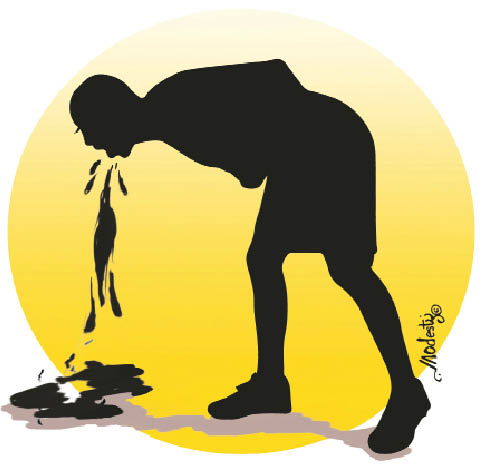Gastroenteritis
Many people in my community are being afflicted with gastroenteritis. Kindly share information about it. Clement V With gastroenteritis, your stomach and intestines are irritated and inflamed. The cause is typically a viral or bacterial infection. If one has watery stool, chills and stomach cramping, then he may have gastroenteritis. Gastroenteritis can be further explained […]

Gastroenteritis
Many people in my community are being afflicted with gastroenteritis. Kindly share information about it.
Clement V
With gastroenteritis, your stomach and intestines are irritated and inflamed. The cause is typically a viral or bacterial infection. If one has watery stool, chills and stomach cramping, then he may have gastroenteritis.
Gastroenteritis can be further explained as an inflammation of the gastrointestinal track (the pathway responsible for digestion that includes the mouth, oesophagus, stomach and intestines). Gastroenteritis is also sometimes referred to as stomach flu even though it may not be related to influenza. Because gastroenteritis is so similar to diarrhoea and because so many cases do not require hospitalisation, it is difficult to determine how many cases of gastroenteritis occur per year.
Those at risk
- Children in daycare
- Students living in dormitories
- Military personnel
- Travellers
- People with immune systems that are weakened by disease or medication.
- Infants
Causes
Gastroenteritis can be caused by viral, bacterial or parasitic infection. Viral gastroenteritis is contagious and is responsible for the majority of outbreaks in developed countries. Common routes of infection include:
- Food (especially seafood)
- Contaminated water
- Contact with an infected person
- Unwashed hands
- Dirty utensils
- In less developed countries, gastroenteritis is more often spread through contaminated food or water.
Symptoms
- The main symptom of gastroenteritis is diarrhoea. When the colon (large intestine) becomes infected with gastroenteritis, it loses ability to retain fluids, which causes the person’s faeces to become loose or watery.
- Abdominal pain or cramping
- Nausea and vomiting
- Fever
- Poor feeding (in infants)
- Unintentional weight loss (may be a sign of dehydration)
- Excessive sweating
- Clammy skin
- Muscle pain or joint stiffness
- Incontinence (loss of stool control)
- Because of the symptoms of vomiting and diarrhoea, people who have gastroenteritis can become dehydrated quickly. It is very important to watch for signs of dehydration, which include extreme thirst and urine that is darker in colour, or less in amount, dry skin and dry mouth and sunken cheeks or eyes.
Treatment
- The body can usually fight off the disease on its own within a few days. The most important factor when treating gastroenteritis is the replacement of fluids and electrolytes that are lost because of the diarrhoea and vomiting.
- Foods that contain electrolytes and complex carbohydrates such as potatoes, lean meat (fish and chicken) and whole grains can help replace nutrients. You can also buy electrolyte and fluid replacement solutions at grocery and drug stores. Or, if hospitalisation is required, the nutrients can be replaced intravenously (injected directly into the veins).
- Antibiotics will not be effective if the cause of gastroenteritis is viral. Doctors usually do not recommend anti-diarrhoeal medication for gastroenteritis because they tend to prolong infection, especially in children.
Prevention
- Washing your hands frequently, especially after going to the bathroom and when you are working with food.
- Cleaning and disinfecting kitchen surfaces, especially when working with raw meat or eggs.
- Keeping raw meat, eggs and poultry away from food that is eaten raw.
- Drinking bottled water and avoiding ice cubes when travelling, especially in developing countries.a
